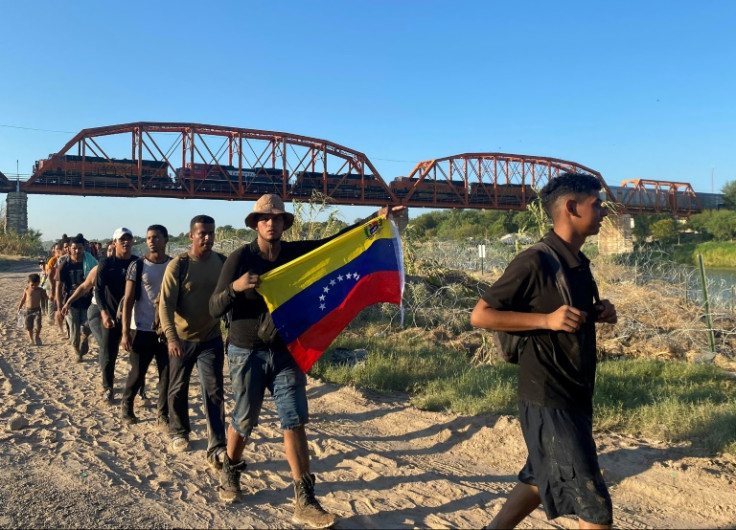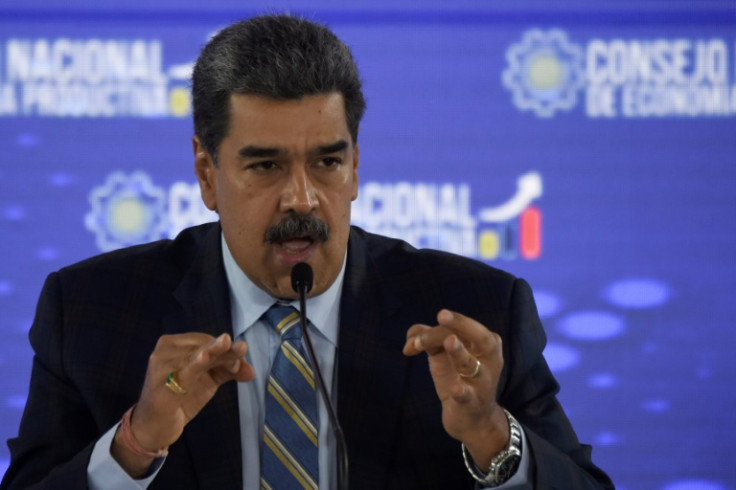
Unlawful border crossings continue to increase in the U.S. this year, reaching a yearly record of over 200,000 in September. Within this piece of data there is one particular component that stands out: according to CBS; about a quarter of the figure were Venezuelans, also a record of nationals seeking to enter the country. The number shatters the previous monthly record, which took place in September 2022, when it reached 34,000.
The Latin Times talked with Christopher Hernandez-Roy, deputy director and senior fellow of the Americas Program at the Center for Strategic and International Studies (CSIS) to get his insights on the reasons behind the issue, as well as the way in which it can affect the Biden administration overall strategy regarding the border.
Hernandez-Roy also analyzed the governments relations with Venezuela at a general level and the country's domestic politics, which are going through a particularly heated moment as the opposition prepares to hold primaries to decide who will face Nicolas Maduro in presidential elections scheduled for next year.
The following conversation was edited for extension and clarity purposes:
CBS reported that out of the roughly 200,000 people who crossed the border unlawfully in September, about a quarter, 50,000, were Venezuelan. How dramatic is the scenario?
The first thing we have to say is there's been a surge generally throughout 2023, a significant increase in 2023 over 2022. . And let's keep in mind we're not even fully through 2023. But this has been going on for many years. There's now over, I think it's 7.8, it's close to 8 million Venezuelans have left in the last few years. It is the largest movement of people including in two active war zones and it's causing a huge crisis throughout the region.
Are they coming exclusively from Venezuela or also from other Latin American countries they previously migrated too and now left?
Both. There are people that are leaving Venezuela still, and while the situation has gotten a little bit better after passing through a tremendously difficult period, the trends are moving negatively again. These countries, like Colombia, Perú, Ecuador, Chile, have over the years responded very generously to the influx of Venezuelan migrants trying to regularize their legal status, offering them social services, trying to get them documented so that they can enter the formal economy. But there's only so much these countries can do because the influx is so great. And there's also a bit of fatigue. Conditions in these countries have not fully recuperated post-Covid. And there's also, to some extent, xenophobia setting in.
Could this flux be impacted by the Maduro government's decision of accepting deportation flights from the U.S.?
I think it's going to have an effect for sure. The administration kind of did two things at the same time. On the one hand, it extended the temporary protection measures of Venezuelans who were already in the U.S., especially the Temporary Protected Status (TPS) but on the other it recognized the tremendous pressure there is. The resources there are stretched also thin to receiving this large influx of migrants.
I think the vast majority of people that are leaving Venezuela are still people that are leaving because of the economic and social conditions that are not able to provide food for their families and so they have to leave. At the same time, there are still some people that have to leave the country because of political reasons, because they're being persecuted by the regime. To sum up, I think this will have an effect and will make people think twice. It may not eliminate the flow. I doubt very much that it would eliminate the flow, but it could lessen it.

Has political violence increased in Venezuela as the opposition primaries get closer?
I'm not sure I can say that there's been an increase in violence yet. What I can certainly say is that the rhetoric and the threats from the government and the actions have. Certainly candidates like Maria Corina Machado, who was leading in the polls, is facing harassment and her staff is facing harassment and intimidation when she goes to campaign events. The truth is we don't know whether the primaries will be able to be held on October 22nd.
I wouldn't be surprised to see a manipulated Supreme Court issuing a ruling in the next few days that suggests that the primaries will be illegitimate unless they are conducted through the CNE and hence they could easily prevent them from taking place. They've already barred Maria Corina Machado, who was leading in the polls, from running in the election, but potentially they could bar other candidates.
Now if the primaries go ahead, which they seem to have every indication that they will, the potential for violence there is very real with the colectivos for instance, other groups supporting the government could easily attempt to disrupt polling places, voting and polling places. So there's already rhetorical violence and intimidation, real intimidation, and the prospects for real violence I think are quite clear.
The news came on the same day the Venezuelan judiciary issued an arrest warrant for Juan Guaido, currently in the US. How do you conjugate an action that could be seen as a gesture to the Biden administration, and that?
I'll say that this this move to accept deportees on the surface would appear to be some sort of a concession, some sort of a thing that will benefit the Biden administration. There's been a lot of talk about the Biden administration being willing to consider the lifting of certain sanctions if progress towards some sort of a freer and fairer elections, but the move to accept returnees has nothing to do with the election. Everything that Maduro has done in the last few months that's in relation to the election has been not to open up any more democratic space, but rather quite contrary to that, moving in the opposite direction. Maduro has not moved in any way, shape or form to create an environment for more credible elections. So, yes, this could be some sort of a concession, but it's not a concession that's related to the elections and therefore, it does not merit any easing of sanctions on the part of the United States.
Do you think there is a calculation on Maduro's end based on the direction of the U.S. elections?
Yes, there are definitely calculations based on how he's seeing the race shaping up. Keep in mind that, apart from the primaries, he hasn't announced a date for the elections. If he sees republicans are shaping up to take the White House, he'll hold them earlier and quickly. If democrats have a better chance, he might drag it out, as he might see some openness to keep the idea of sanctions relief in exchange for concessions. However, he does not intend to make concessions on elections. He can't afford to lose power, because when he does he has the International Criminal Court over his and his cronies necks. He needs to stay in power to not face international justice.
© 2025 Latin Times. All rights reserved. Do not reproduce without permission.





